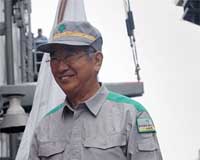 |
Beijing (AFP) April 12, 2011 The world's major emerging powers -- Brazil, Russia, India and China -- welcome South Africa into their fold this week at a summit in China that will seek to give developing nations greater global clout. Leaders of the BRICS nations will tackle a host of issues including the conflict in Libya on Thursday in Sanya on southern Hainan island, though China's exchange rate regime will be off-limits, experts and officials say. The summit could also offer China an opportunity to position itself as the leader of the world's emerging economies, and as a powerful counterpoint to the West, they add. Chinese President Hu Jintao will chair the talks with his Brazilian, South African and Russian counterparts Dilma Rousseff, Jacob Zuma and Dmitry Medvedev, and Indian Prime Minister Manmohan Singh. Goldman Sachs first coined the term BRIC in 2001 to describe the growing influence of the world's four largest emerging economies. China invited South Africa to join the group at the end of last year. Together, the five countries represent more than 40 percent of the world's population. The International Monetary Fund has said the group will account for 61 percent of global growth in 2014. "The one thing on which BRICS will be able to work together is to raise the profile and influence of emerging powers," Andrew Kenningham, a London-based economist at Capital Economics, told AFP. "Including South Africa -- which has more to do with its political and perhaps symbolic importance as the leading African economy -- will make this easier." South Africa is growing more slowly than its BRICS partners, and its economy was only one 16th the size of China's last year, according to Kenningham. The leaders -- who are expected to release a joint statement, according to the Brazilian delegation -- will attempt to reach common ground on a range of issues, notably on the situation in war-torn Libya. South Africa was the only BRICS nation to approve a UN Security Council resolution establishing a no-fly zone over Libya and authorising "all necessary measures" to protect civilians, opening the door to coalition air strikes. The other four countries have expressed concern that the NATO-led campaign -- which aims to prevent a bloody crackdown by Libyan leader Moamer Kadhafi on rebels seeking to end his 41-year rule -- is causing civilian casualties. Zuma said on a visit to Tripoli at the weekend that Kadhafi's regime had accepted an African Union peace plan designed to broker a truce between the embattled Libya leader and the rebels. Chinese assistant foreign affairs minister Wu Hailong told reporters at a briefing about the summit that the situation in Libya would "be of major concern to the BRICS leaders". Shi Yinhong, a professor of international relations at Beijing's Renmin University, said the issue was bound to come up, and some consensus would be reached. "They could in principle call for a ceasefire, a political solution, and call on the international community and the United Nations to adopt measures to slow the humanitarian disaster," he said. Also on the agenda will be how to strengthen BRICS' contribution to the reform of the international monetary system, Wu said. But many issues that divide the five nations, such as China's yuan policy or reform of the UN Security Council, are not likely to come to the fore -- at least not openly, said Wu. "This is not the appropriate venue" to discuss such matters, he said. Brazil believes the yuan is undervalued, giving China an edge on exports and hurting the South American nation's trade balance. Both India and Brazil, meanwhile, would like to become permanent members of the Security Council -- moves backed by Russia but not yet endorsed by China. Russell Leigh Moses, a Beijing-based political analyst, said the summit would also be a chance for visiting countries to see just how much of a leadership role China wants to play. "Does it want to align itself with the great powers or does Beijing want to keep looking out more for the less than powerful states?" he said. "There is an effort by the BRICS to press Beijing to go in one direction or the other. They'd like to know where China stands."
Share This Article With Planet Earth
Related Links Learn about the Superpowers of the 21st Century at SpaceWar.com Learn about nuclear weapons doctrine and defense at SpaceWar.com
 Ishihara re-elected Tokyo governor in post-quake vote
Ishihara re-elected Tokyo governor in post-quake voteTokyo (AFP) April 10, 2011 Shintaro Ishihara, famous for his often provocative nationalistic remarks, won a fourth term as Tokyo governor Sunday in local elections dominated by last month's massive disaster in Japan. He came under fire last month for calling the March 11 quake-tsunami catastrophe "divine punishment", claiming the waves had washed away the "greedy mind" of Japanese people. He later retracted the commen ... read more |
|
| The content herein, unless otherwise known to be public domain, are Copyright 1995-2010 - SpaceDaily. AFP and UPI Wire Stories are copyright Agence France-Presse and United Press International. ESA Portal Reports are copyright European Space Agency. All NASA sourced material is public domain. Additional copyrights may apply in whole or part to other bona fide parties. Advertising does not imply endorsement,agreement or approval of any opinions, statements or information provided by SpaceDaily on any Web page published or hosted by SpaceDaily. Privacy Statement |